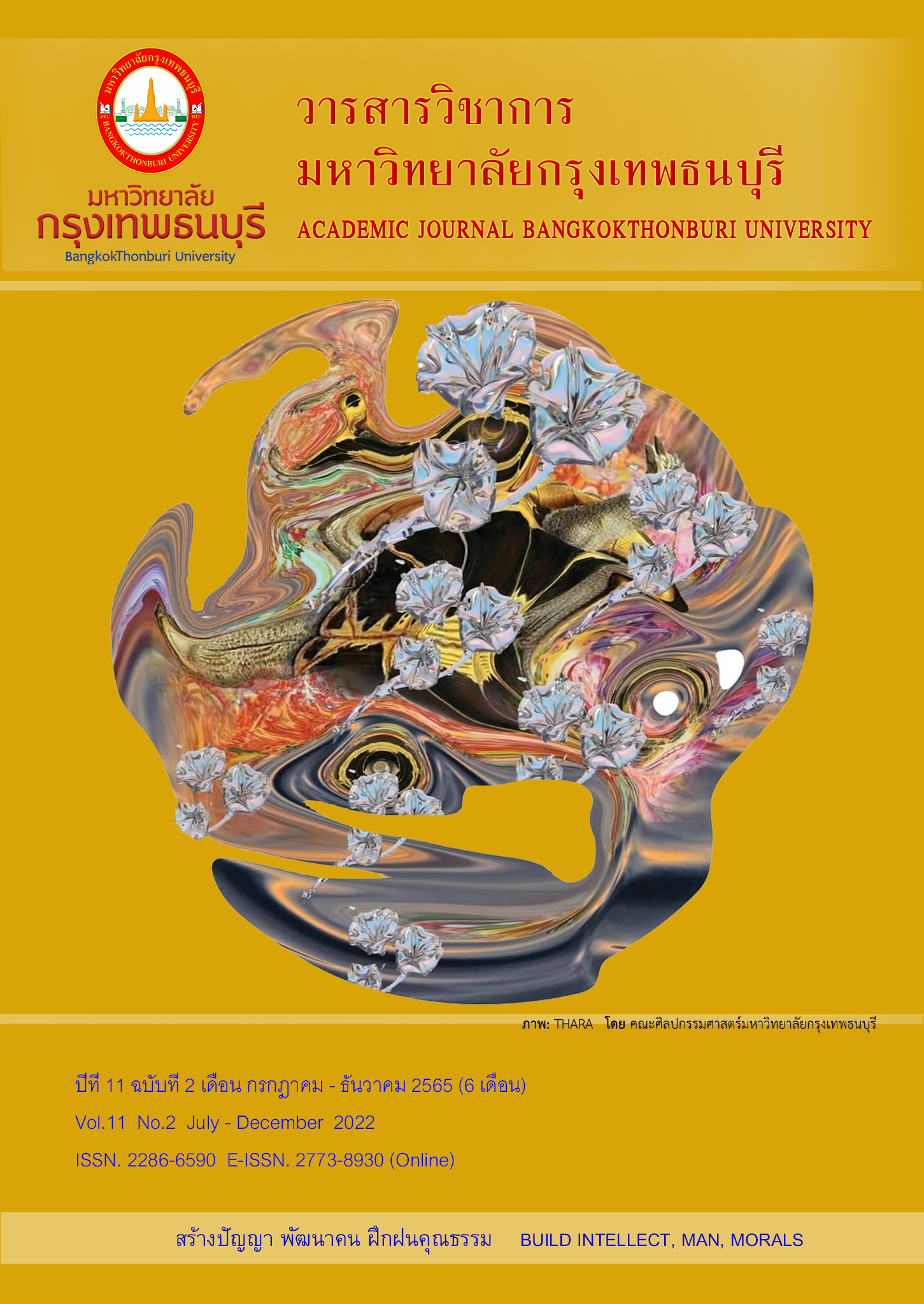Brand Factors Influencing Repurchase Intention by Analyzing the Value Chain of Processed Fruit Products in The Eastern Region: Durian Case Study
Main Article Content
Abstract
The purpose of the study was 1) to study the value chain of processed fruit business; 2) to study the perceptions of tourists affecting their attitudes towards purchasing processed fruit products; 3) to study the factors influencing the intention to repeat purchase processed fruit products of Thai tourists. This study used the Convergent Parallel Mixed Methods Design, namely: 1) Qualitative Research, collecting data with an in-depth interview by selecting specific key informants, namely: agricultural academics, brand builders, successful and unsuccessful branded farmers, 20 non-branded farmers in 3 provinces, namely: Rayong, Chanthaburi, and Trat; 2) Quantitative Research, collecting data by using questionnaires. A multi-stage random sampling method was used for 400 students, aged 18-25 years at Burapha University. The descriptive data analysis methods were used, i.e. mean, percentage, standard deviation, and inferential statistical analysis. Multiple relationships were analyzed by testing hypothesis using multiple linear regression equations. The statistical significance was determined at the .05 level. It was concluded that the four factors affecting brand awareness were trust, brand identity, brand image, and brand preference, having a positive influence on repurchase intention. 1) to study the value chain of processed fruit business; 2) to study the perceptions of tourists affecting their attitudes towards purchasing processed fruit products; 3) to study the factors influencing the intention to repeat purchase processed fruit products of Thai tourists. This study used the Convergent Parallel Mixed Methods Design, namely: 1) Qualitative Research, collecting data with an in-depth interview by selecting specific key informants, namely: agricultural academics, brand builders, successful and unsuccessful branded farmers, 20 non-branded farmers in 3 provinces, namely: Rayong, Chanthaburi, and Trat; 2) Quantitative Research, collecting data by using questionnaires. A multi-stage random sampling method was used for 400 students, aged 18-25 years at Burapha University. The descriptive data analysis methods were used, i.e. mean, percentage, standard deviation, and inferential statistical analysis. Multiple relationships were analyzed by testing hypothesis using multiple linear regression equations. The statistical significance was determined at the .05 level. It was concluded that the four factors affecting brand awareness were trust, brand identity, brand image, and brand preference, having a positive influence on repurchase intention.
Article Details

This work is licensed under a Creative Commons Attribution-NonCommercial-NoDerivatives 4.0 International License.
References
Aaker, D. A. (1991). Managing brand equit: Capitalizing in the value of a brand name. New York: Free Press.
Aaker, D. A. (1996). Building Strong Brand. New York: Free Press.
Dam, T.C. (2020). The Influence of Brand Satisfaction, Brand Trust, Brand Preference on Brand Loyalty to Laptop Brands. A multifaceted review journal in the field of pharmacy, 11(11), 95-101.
Hair, Jr.J.F., Black, W.C., Babin, B.J. and Anderson, R.E. (2019). Multivariate Data Analysis (8th edition). United Kingdom: Cengage Learning EMEA.
Jaru, T. (2020). Durian Krung Ching, the future of agriculture, Thailand to foreign markets. Journal of Human Society, 10(2), 54-68.
Lien, C.H., Wen, M.J., Huang, L.C. and Wu, K.L. (2015). Online hotel booking:
The effects of brand image, price, trust and value on purchase intentions. Asia Pacific Management Review, 1(1), 1-9.
Office of Agricultural Economics. (2022). 4 types of oriental fruit this year, total output of 1.19 million tons, an increase of 32%, will be abundantly marketed in May. Retrieved July 9, 2022, from https://www.oae.go.th/view/1/
Porter, E. M. (1985). Competitive Advatage. New York: The Free Press.
Sullivan, Y.W. and Kim, D.J. (2018). Assessing the effects of consumers’ product evaluations and trust on repurchase intention in e-commerce environments. Journal of Information Management, 39(C), 199-219.
Veloutsou, C. and Ballester, D.E. (2018). New challenges in brand management. Spanish Journal of Marketing, 22(3), 254-271.
Yamane, T. (1973). Statistics: An Introductory Analysis (3rd Ed). New York: Harper and Row Publications.


